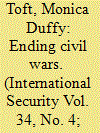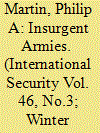| Srl | Item |
| 1 |
ID:
094411


|
|
|
|
|
| Publication |
2010.
|
| Summary/Abstract |
Since 1990, negotiated settlements have become the preferred means for settling civil wars. Historically, however, these types of settlements have proven largely ineffective: civil wars ended by negotiated settlement are more likely to recur than those ending in victory by one side or the other. A theoretical and statistical analysis of how civil wars end reveals that the type of ending influences the prospects for longer-term outcomes. An examination of all civil war endings since 1940 finds that rebel victories are more likely to secure the peace than are negotiated settlements. A statistical analysis of civil wars from 1940 to 2002 and the case of Uganda illustrate why rebel victories result in more stable outcomes. Expanding scholarly and policy analysis of civil war termination types beyond the current default of negotiated settlement to include victories provides a much larger set of cases and variables to draw upon to enhance understanding of the conditions most likely to support long-term stability, democracy, and prosperity.
|
|
|
|
|
|
|
|
|
|
|
|
|
|
|
|
| 2 |
ID:
183650


|
|
|
|
|
| Summary/Abstract |
Why do some winning rebel groups build obedient and effective state militaries after civil war, while others suffer military defections? When winning rebels face intense security threats during civil wars, rebel field commanders are more likely to remain obedient during war-to-peace transitions. Intense security threats incentivize militants to create more inclusive leadership structures, reducing field commanders’ incentives to defect in the postwar period. Intense security threats also reduce commanders’ capacity for postwar resistance by forcing insurgents to remain mobile and adopt shorter time horizons in rebel-governed territory, reducing the likelihood that field commanders will develop local ties and independent support bases. The plausibility of the argument is examined using a new list of winning rebel groups since 1946. Two case studies—Zimbabwe and Côte d'Ivoire—probe the causal mechanisms of the theory. The study contributes to debates about the consequences of military victory in civil war, the postwar trajectories of armed groups, and the conditions necessary for civil-military cohesion in fragile states.
|
|
|
|
|
|
|
|
|
|
|
|
|
|
|
|